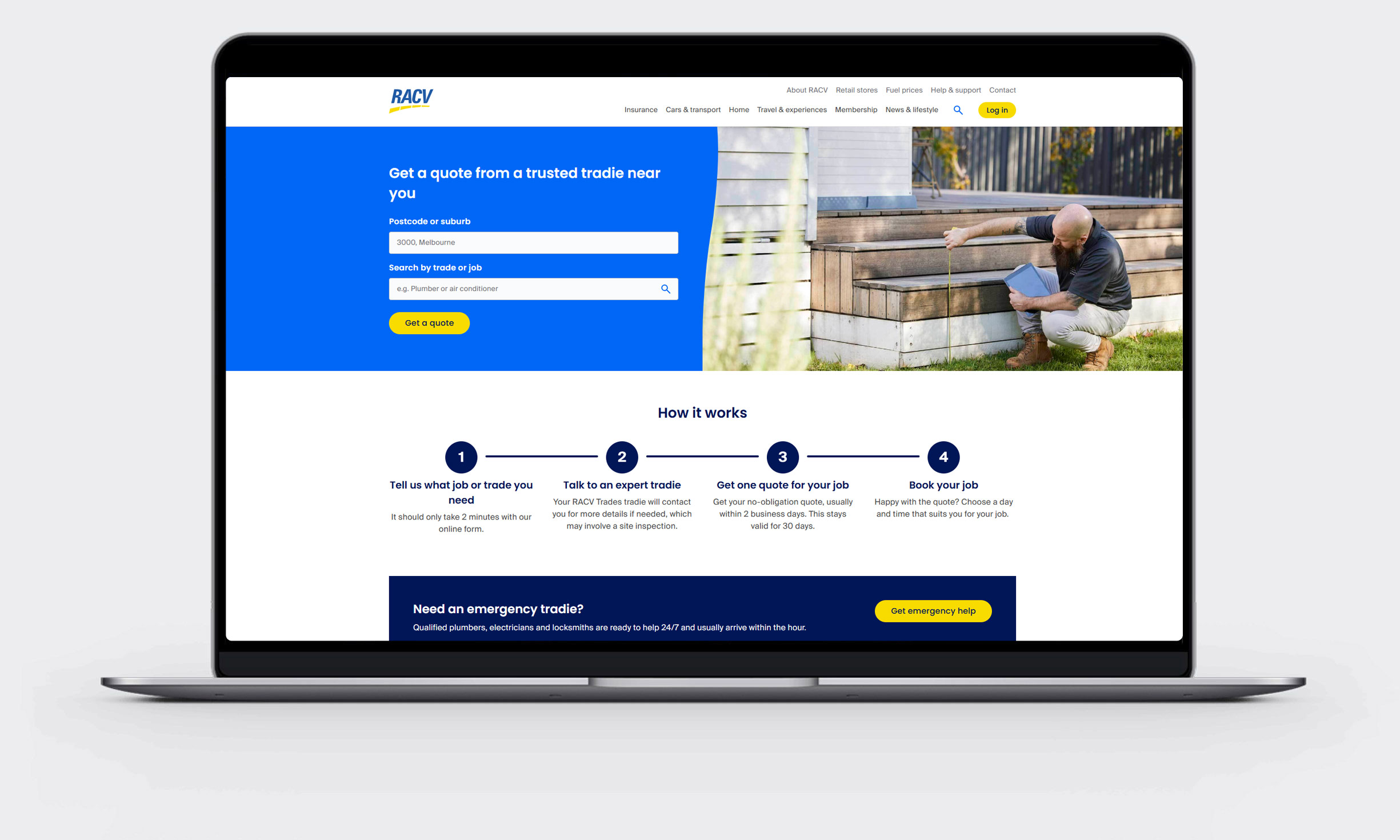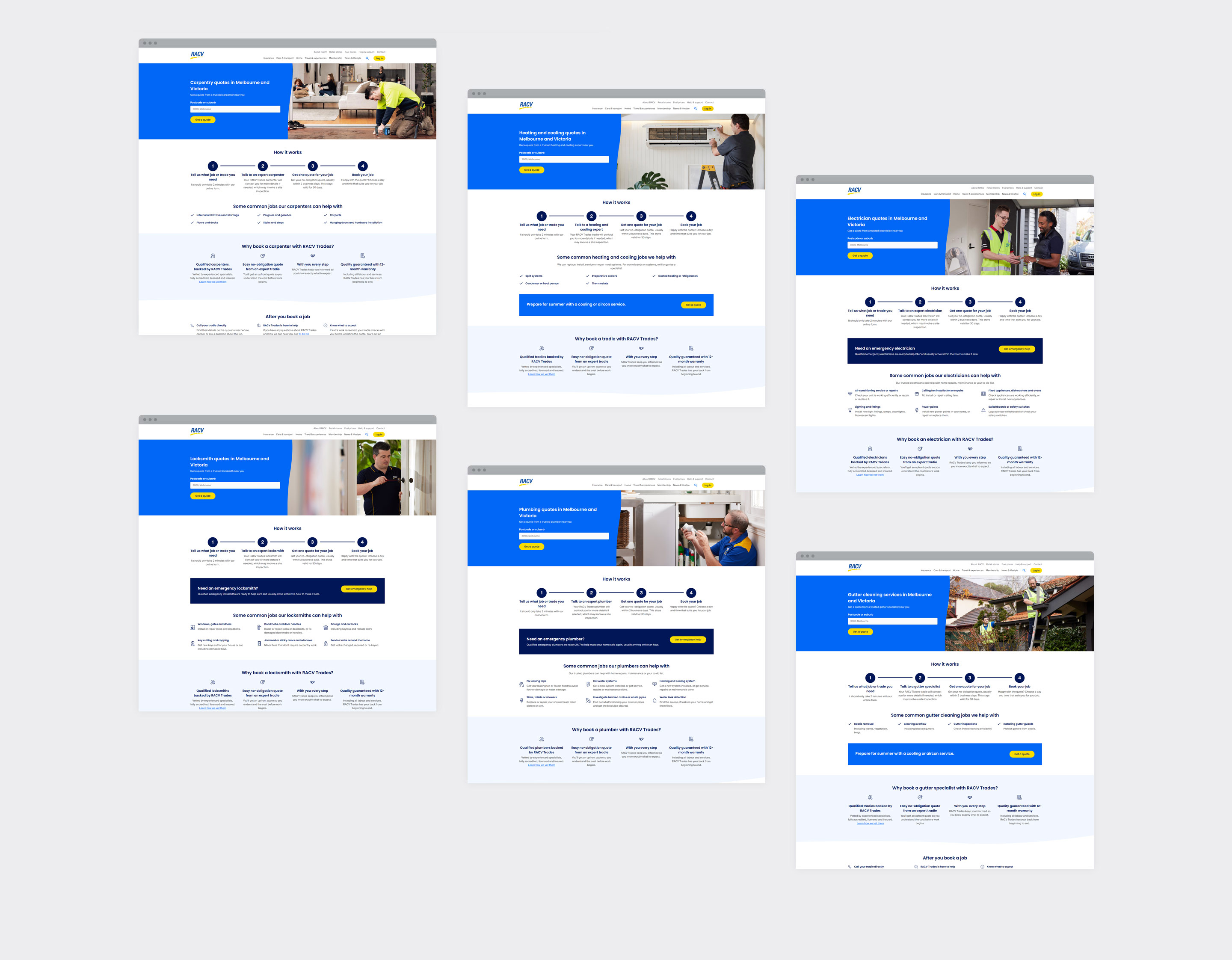CLIENT
RACV Trades
MY ROLE
UX Design
UI Design
Service Design
SUMMARY
I led UX design for RACV Trades, simplifying RFQ to job management in the membership portal

PROBLEM STATEMENT
A year after launching the unauthenticated RFQ experience, RACV observed significant drop-off rates, suggesting friction in the request process. Users faced challenges navigating the flow, lacked clarity on next steps, and felt uncertain about submitting job requests. These barriers led to incomplete requests and reduced engagement.
To address this, RACV set out to design a seamless digital experience for customers seeking trade services — whether they were logged into their membership portal or browsing as unauthenticated users. The goal was to refine the RFQ journey, making it intuitive and frictionless from job request to quote approval and payment. Additionally, the solution needed to integrate with HTHA’s CRM to enhance job coordination, streamline trade assignments, and improve overall service efficiency.

Project Goals
Make it easy for users to request trade services without unnecessary friction
Embed the RFQ journey flow into the membership portal to encourage member logins and uptake of related services
Improve job coordination between RACV and HTHA’s CRM
Provide a clear, guided experience for users to review, approve or decline trade quotes
Ensure a responsive, user-friendly experience across all devices
APPROACH
I conducted several rounds of usability testing with 12 participants to analyse how they navigated the existing RFQ experience. Testing revealed major pain points, including high drop-off rates, confusion around next steps, and trust barriers when submitting job requests.
Beyond user research, I led strategic workshops with HTHA — the team responsible for job coordination. Their insights highlighted inefficiencies in how job requests were processed and assigned to tradespeople.
With these insights, I redesigned the RFQ process, simplifying interactions while ensuring a seamless transition between unauthenticated and authenticated journeys. The final experience seamlessly integrated into the RACV membership portal, providing a dashboard where users could track job progress, manage requests, and complete payments.
As a result, job completion rates increased by 45% year-over-year (YoY), significantly reducing drop-offs and improving overall service efficiency.

The Dashboard
Once a job request is submitted, users can log into the RACV membership portal to track the status of all requested jobs, monitor progress, review quotes and make payments — all in one central location.

Select a Service
Users can easily select the trade service they need, with smart conditional fields guiding them to ensure accurate job coordination and pairing with the right tradie.
Describe the Job
In addition to entering work details for clarity, users can upload photos of the job. This helps tradespeople assess the scope more accurately and provide more precise quotes, reducing unnecessary back-and-forth.


Your Contact Details
Users provide their first name, last name, mobile number, email, and property address to facilitate seamless job coordination.
Review and Submit
A final confirmation step ensures users can review their request before submission. They can also go back and edit any section before finalising.


Confirmation
The system outlines the next steps, providing clarity and reassurance about what to expect.
Review and Approve Quotes
Users can easily review, accept or decline trade quotes with clear guidance that makes decision-making straightforward.


Manage Jobs in the Dashboard
The membership portal provides users with a seamless way to track submitted jobs, monitor progress, review quotes and complete payments all in one place.
Result
We observed the following results after the redesigned RACV Trades service went live
27%
Increase in RFQ completion rates
11%
Increase in quote acceptance rates
19%
Decrease in exit rates
Learnings
The user is always right
This project reinforced the value of user-centered design and the impact of iterative testing. Regular engagement with real users helped uncover key friction points, allowing us to refine the RFQ journey and reduce drop-offs. Collaboration with HTHA and testing with their team ensured operational efficiency, making job coordination seamless between RACV and tradespeople.
